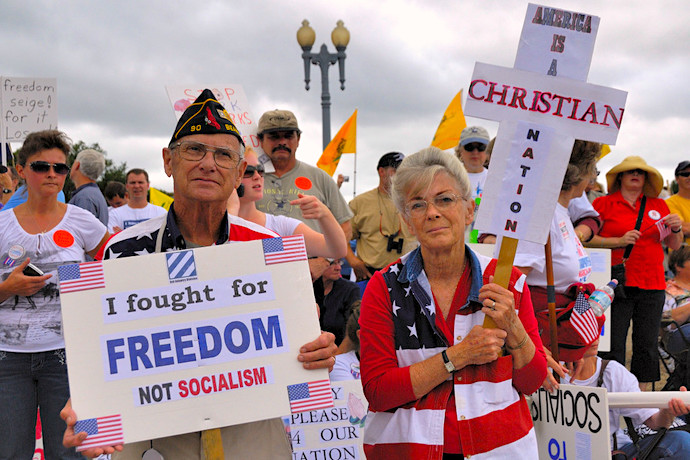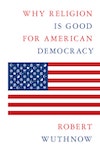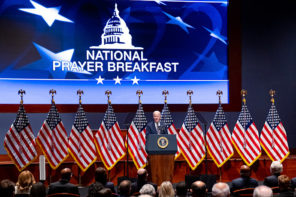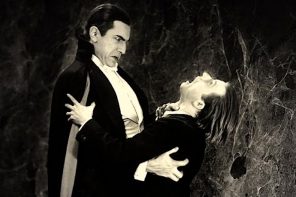At a time when Christian Nationalism is finally being recognized as a threat to democracy, not only by legacy media, but also by the National Council of Churches and the rapidly secularizing population of the US, Robert Wuthnow, the dean of American sociologists of religion, sets himself a daunting task in attempting to make the case for religion’s positive impact on the health of our democracy. In my judgment, his case fails. It fails in part because Wuthnow wants to be fastidiously fair to all players in the religious arena, and he doesn’t fully appreciate how some of the players will never play fair.
Wuthow’s line is that too many other scholars have mistakenly believed that religion’s importance for democratic thriving comes from its ability to bring us together. He argues instead that benefits flow from what he calls the “agonistic pluralism” that characterizes religion on these shores—i.e. from the variety of sects and traditions and points of view on public issues. In fragmentation there is strength: at least that’s the premise.Wuthnow declares in his introduction that American religious diversity is sufficient to mute any authoritarian currents and that despite a “disturbing trend” toward political polarization with distinct religious overtones, we needn’t worry too much because the U.S. Constitution sets the ground rules.
He then moves to examples—to case studies drawn from different historical periods—which, to his mind, show how religious diversity saves the day. The trouble here is that, in each case, it’s not at all clear that believers have played a helpful role. He begins with the New Deal, during which many leading religious figures joined corporate leaders in portraying Franklin Roosevelt as the Antichrist. Wuthnow faithfully records this widespread resistance to Roosevelt and the fear that he harbored dictatorial ambitions. But then he suggests that some small-scale religious efforts to put a stop to lynchings during these same years means that it all worked out pretty well. Some negative scoring for religion, but also a few points on the plus side make for a net positive overall.
He moves on to consider freedom of conscience, where it can certainly be argued that religious groups—mainly the dissident ones—did in fact make some degree of conscientious objection possible in the midst of raging war fever during both the First and Second World Wars. Wuthnow doesn’t dwell on the religious voices that were baying for the objectors to be hung by their thumbs, although he does pay some attention to the ones calling for severe limitation of the permissible grounds for conscientious objection.
Wuthnow’s treatment of the conformist 1950s is perhaps the weirdest section of the book in that he carefully documents the many robust efforts to conflate an uncritical patriotism with true Christian faith: the birth of the National Prayer Breakfast and the addition of the words “under God” to the Pledge of Allegiance, betokening a much larger cultural shift in the direction of fusing faith and flag. When he searches for examples of a very different kind of religious voice in the civic space, the best he can come up with is the way in which a few campus ministries began to morph into support operations for early civil rights efforts during those years. Small potatoes, I’d say, in the overall scheme of things.
But to my mind, what totally undercuts Wuthnow’s argument for healthy religious contestation during the 1950s is the overwhelming religious opposition, across the spectrum, to the campaign to get the United States to ratify the Universal Declaration of Human Rights. If there was a healthy diversity of religious views during the McCarthy period, why did so very few American faith leaders find it possible to take a strong stand for universal human rights?
Oh, and one other thing: while it might be true that a few campus ministries joined hands with civil rights activists, by far the main development in campus ministry during the early postwar years was the founding of the Campus Crusade for Christ in 1951 and the Fellowship of Christian Athletes in 1954. And why on earth does Wuthnow make no mention of Dr. King’s searing “Letter from a Birmingham Jail,” addressed to clergy sitting on the fence in the face of widespread inequality and misery, which says pretty much all that needs to be said about religious quiescence and timidity during the 1950s and early 1960s?
Wuthnow’s argument fares no better when he takes on the question of America’s religious engagement with questions of public welfare and human dignity. There was never any effective religious counterpoint to Ronald Reagan’s reframing of the welfare issue as a matter of personal responsibility and private charity rather than public provision. I have vivid memories of how religious sentiment lined up on this question on account of my own efforts in New York to call out then-mayor Rudy Giuliani’s especially cruel version of “welfare reform” during the Clinton years, once Clinton had muscled through his Reagan-inflected “personal responsibility” bill in 1996.
I was roundly denounced by ostensibly progressive clergy colleagues—and by several ostensibly liberal newspaper columnists—for getting my morals wrong; these distinguished leaders insisted that Giuliani was entirely correct in forcing poor young mothers to sweep streets and rake leaves in order to receive the money needed to feed their children—that it was these women’s morality that needed upgrading, not Rudy’s.
To his credit, Wuthnow does take note of the way in which, during the 1980s and 1990s, the focus of traditional Catholic discourse around human dignity was increasingly transferred from concern for the dignity of the poor to concern for the fate of the “unborn.” He also takes note of how the language of victimhood—the endless whining about alleged anti-Christian persecution—became a central feature of Religious Right rhetoric during these decades. Too bad he has to close this chapter with an extremely weak defense of his main argument: “religious organizations did not themselves advocate for democracy, other than defending religious freedom, but provided the occasions on which advocacy for democracy occurred.” Hunh? By this logic arsonists provide the occasion on which the bravery of firefighters is displayed.
When I first glanced at Wuthnow’s chapter headings I entertained the fleeting thought that the topic of the wealth gap—that gnawing multi-generational civic concern of highest import—might actually be the arena in which “agonistic contestation” among religious viewpoints could be shown to yield at least marginal benefits for the health of democracy.
Naive little me! What we get here is mainly crickets from an author struggling to treat this topic in a way that advances his argument. And again, this is partly because Wuthnow is too conscientious to ignore the evidence of the massive investment made by wealthy people and corporations to secure religious validation for the rule of wealth—and indeed for the virtue of wealth.
Wuthnow gives us a detailed and useful accounting of lavish “pay for pray” spending by tycoons and robber barons like J.P. Morgan, Cornelius Vanderbilt, Anthony Drexel, John D. Rockefeller, J. Howard Pew, H. L. Hunt, Harvey S. Firestone, etc. He notes that even Social Gospel icon Walter Rauschenbusch was careful to limit criticism of his fellow Baptist and potential benefactor, Mr. Rockefeller.
Yet despite this Wuthnow-supplied documentation, and despite the additional negative evidence posed by the prominence of Prosperity Gospel preachers and the rise of creepy “faith friendly” corporate leaders, Wuthnow finds himself unable to draw the obvious conclusion that American religion has, on the whole, been deeply complicit in the buildup of savage inequality during both our first and second gilded ages.
Wuthnow mentions the handful of regional faith-based organizations that advocate for worker rights and fair wages before offering this stunning piece of equivocation at this chapter’s conclusion:
But was this a problem? Was a high level of income inequality detrimental to democracy? The literature that tried to address the question came up with different answers. Studies comparing the histories of countries in Europe and the Americas concluded that it was impossible to demonstrate that wealth inequality delayed or deterred the adoption of democratic forms of government. Studies of late twentieth-century legislative decisions in the United States did show—unsurprisingly—that they favored the interests of the wealthy. The studies did not demonstrate, however, that these decisions threatened democracy, just that they went against public opinion on certain issues such as estate taxes and support for a minimum wage.
Again: Hunh?? And not a word here about Citizens United or about the rivers of dark money that so obviously, to me at least, deeply undermine what’s left of American democracy. And why were so many religious conservatives sufficiently interested in fiscal policy to rally behind the Tea Party?
To Wuthnow this is “puzzling,” because “it should have been in the interest of religious leaders whose congregations were helping people whose homes were being foreclosed and whose jobs were being lost…to support the government’s economic stimulus programs.” What our eminently reasonable sociologist just cannot seem to grasp is the extent of the nihilism among Religious Right types. He doesn’t explicitly mention the Religious Right currents behind the rise of Trump and Q-Anon, perhaps because he knows that his overall argument is already hanging by a thread at this point.
I’m skipping over Wuthnow’s treatment of religious contention around issues of immigration and Covid, because (again) what we get on these is yet more on the one hand/on the other hand reporting about religion’s role in these much-disputed areas. Of course, on the one hand/on the other hand is more or less Wuthnow’s entire argument: the existence of two opposing sides shows that religion is doing its job. But when justice and sanity hang in the balance, we need more than Tweedle Dee and Tweedle Dum from religion, do we not?
I must say I found it astonishing that this careful scholar ended his book while leaving behind a huge and glaring omission. It dumbfounds me that someone could write a book about religion and democracy in the American context without addressing faith community responses to the 9/11 attacks and the catastrophic War on Terror that ensued. Unless my memory totally fails me, American religious leaders were mainly supportive of the “dark side” measures Dick Cheney told us were necessary in order to protect us against the alien evildoers.
Yes, we did see some sporadic faith-involved protests over Gitmo, Abu Ghraib, waterboarding, extraordinary renditions, and all of the other horrors we committed in the name of national security. In the immediate aftermath of the attacks there were some expressions of solidarity with the Middle Eastern and South Asian people, many of them citizens, being swept up and thrown into federal detention centers. Overwhelmingly, however, American faith leadership held its tongue rather than risk running afoul of the national thirst for revenge.
Some of us thought back then that democracy was entering its darkest hour and that religion was failing or had failed its acid test. And this was two decades before Jan. 6, 2021, when (again) we witnessed intermittent squeals of protest from the religious left but mainly just a great deal of anguished hand wringing and general lamentation among the broad mass of the faithful.
One doesn’t expect a scholarly book to be totally up to the minute on all of the real and present dangers that U.S. democracy finds itself facing today. But it does seem odd and very troubling that Robert Wuthnow cannot seem to see the forest for the trees at a time like this. In the book’s conclusion he writes that the role of conservative Christians in bringing us to the apocalyptic hour “has puzzled most observers” (there’s that weasel word “puzzle” again), when it seems to me that plenty of competent observers have totally nailed the centrality of white nationalism in what now passes for conservative Christianity in this country.
In his final pages Wuthnow acknowledges that extreme polarization “has not been healthy for democracy”; he nevertheless affims his belief that “checks and balances” among contending religious viewpoints will ensure protection from any threat from the authoritarian side.
I wish I could share his confidence. I really do. But it sure sounds like whistling in the dark to me.






